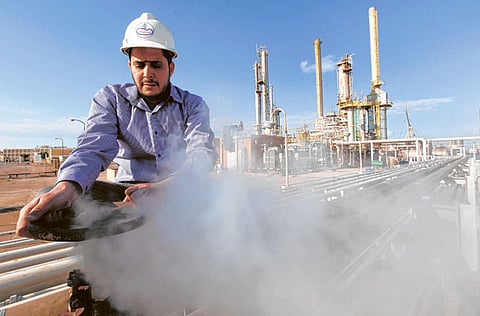Revolutions cause ripples in oil market
Revolutions cause ripples in oil market

Three revolutions in 40 days are too much for the oil market, especially when none of them is yet over. The Tunisian revolution put the market on alert though Tunisia does not produce much oil. The Egyptian revolution raised the alarm because of the Suez Canal and the Sumed pipeline and their role in the international transportation of oil and gas.
However, the knockout effect is the Libyan revolution, which started on February 17 to send oil prices to levels that had not been seen since before the economic crisis of 2008.
The January average price of Opec reference basket of crude oils (ORB) was $92.83 (Dh341.42) per barrel but the price at the beginning of February was already higher at $96.36 per barrel due to increased activity in the futures market, improving economic perceptions and cold weather. Both Opec and IEA have made some adjustments to their supply and demand balances such that the prospect for Opec oil is better than what was forecast a few months ago. The demand for Opec crude oil is likely to increase from 29.3 million barrels per day (bpd) in 2010 to 29.8 million bpd in 2011 in spite of increases in non-Opec supplies and Opec's natural gas liquids.
All the above, as important as they are, were not necessarily the reasons for the price movement in February as the price fluctuated to settle on $99.70 per barrel on February 17. The price then rose sharply as a result of events in Libya to $111.01 on February 24 and the average for the month is close to $100 per barrel, almost 37 per cent above that of July 2010.
Covering shortage
Libyan production in January was close to 1.6 million bpd and its exports are around 1.3 million bpd. The majority of its exports go to Europe and almost 40 per cent goes to Italy. Therefore, Brent crude prices, as the benchmark for Europe rose to $120 per barrel before settling at a lower level in expectations of increased supply from Opec to cover shortages from Libya.
It is not exactly clear whether Libyan exports have completely stopped although most indications say so. Most Libyan fields and terminals are in eastern Libya and it can safely be assumed that they are in the hands of revolutionaries. Substituting Libyan exports is not exactly a straight-forward undertaking. Libyan crude is light with less sulphur and spare production in Opec countries is usually heavier with more sulphur. However, the market has its ways of switching supplies and the modern refineries have sufficient flexibility to cope and in any case the consuming countries must have plenty of stocks to take them a few weeks before crude quality becomes a problem, if ever.
Strategic reserves
Consuming countries were calling on Opec to increase production even before Libyan exports declined and before looking at the possibilities of using their very high stocks. By the end of last year commercial oil stocks in the industrial countries were close to 2,700 million barrels in addition to over 1,500 million barrels in strategic reserves. One wonders what these stocks are for if consumers do not want to rely on them now.
In any case, Saudi Arabia increased its production to over 9 million bpd and Iran took advantage of the situation selling oil stored in tankers to reduce these stocks. I believe that producers may ignore previous agreements. In January Opec crude oil production excluding Iraq's was close to 27 million bpd or 2.2 million bpd over the agreed ceiling by Opec. Therefore, there was no need for a special Opec meeting to sanction the new increases. These announcements cooled the market and the US also did not rule out dipping into its strategic reserves. The US said that oil prices must be monitored.
Austan Goolsbee, chairman of the president's Council of Economic Advisers, said "if the price of oil stays where it is now, it will not harm the economy" and added "fuel costs are something like 10 per cent or less of consumer expenditures, and overall inflation remains very low".
Lower speed limit
While Italy's economics minister did not expect any shortages, Spain said it would lower highway speed limits, cut train ticket prices to get more riders on board and use more bio-fuel to offset any shortages from Libya, an overreaction at least.
On January 5 the ripples of the revolution started in Tunisia and it is about time that all countries in the Arab world look carefully at themselves and drive for real and deep reforms to avoid the onslaught of revolution.
The writer is the former head of Energy Studies Department at Opec Secretariat in Vienna.
Sign up for the Daily Briefing
Get the latest news and updates straight to your inbox



